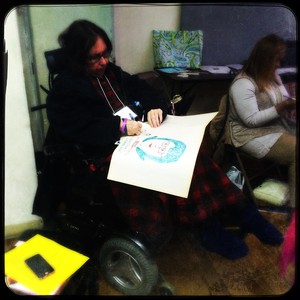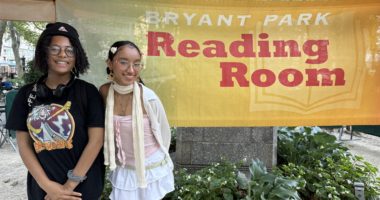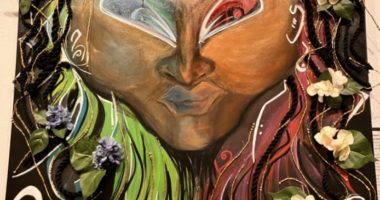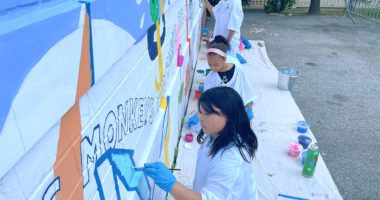I came to the Teaching Artist Training & Internship Program (TATIP) because I want to change the world.
Life is unfair and that has always bothered me. I grew up in Texas. After first grade, I was promoted to second, but all my Mexican friends were held back. I wondered why. They were smart kids too. My Baptist friends thought I was headed straight to hell because I was Methodist, while the Methodists thought my Christian Science friends were totally damned. I didn’t get it. We were all good people, but it shows how small our world was. No one even considered Jewish people or Muslims. We didn’t know any.
After college, I moved to New York City. My world grew exponentially. I made friends from widely different backgrounds. Unfairness was still present – I particularly noticed the huge gaps between rich and poor – but, as a white woman, very little was aimed at me. I was largely an observer.
Until I began using a wheelchair.
I was still me. My legs just didn’t work well enough to walk. But suddenly discrimination became my daily reality. I lost jobs because some people couldn’t take seeing a musician on stage in a wheelchair. I lost job interviews when I asked if the interview site was wheelchair accessible. I couldn’t visit most of my friends because their houses had steps, and had to enter many buildings through back doors and garbage-filled alleys for the same reason. Public transportation became next to impossible and the alternative, Access-a-Ride, is notorious for its slipshod service. I hated going out in public because people stared, servers in restaurants asked my companions “What does she want?”, and parents in the mall gathered their children to them when I passed, as if I would run amok at any second.
Before long, I understood what it was like to be considered “less than.” When I couldn’t get on a bus at all, I empathized with those who had been relegated to the back. When I faced job discrimination, I thought of all the other irrational reasons job seekers had been rejected in the past. On one hand, I felt sorry for the ignorance of people who weren’t comfortable with me; on the other, I felt like Frankenstein’s monster.
Social justice sprang to the top of my agenda. I wasn’t on the sidelines anymore. I was fighting for my life. Plenty of other people were fighting for their lives, too. Now I could relate.
“Education is the most powerful weapon you can use to change the world.”
-Nelson Mandela
The world needs changing, for all of us, and Community-Word Project’s TATIP is giving me the tools I need, so I can give students the tools they need.
Author and TATIP facilitator Renée Watson presented a powerful exercise. She had a plastic bag filled with assorted objects — a piece of candy, a tea bag, paper clip, and other assorted small items. We stood in a circle. Renée passed the bag around, asking each of us to take the one object that was most appealing. About three quarters of the way around, the bag was empty. The rest of the circle was out of luck. The message was obvious. But for the first time, “Life is unfair” became a statement of hope, not a declaration of defeat. “Your circumstances are not your fault. Life is unfair. Now get past it and get back to your work.”
I want to change the world. Things have already shifted for the better in my lifetime — LGBT rights, for example, and so change is possible, but we still need more. And, as Nelson Mandela said, “Education is the most powerful weapon you can use to change the world.”
I am no Nelson Mandela, but if I can learn to ignite sparks in the minds of children, my work may create ripples that reach the Nelson Mandelas of the future.
When people tell the story of Rosa Parks, they often leave out one of the most important parts. Parks didn’t sit down on that bus on an impulse. Her action was no accident. She sat down on that bus because, through her activism and with community organizing education at Tennessee’s Highlander Center, she knew that declaring her right to that seat was the next step in winning civil rights for all African American people.
-Carolyn Clark, 2015-16 TATIP Trainee




